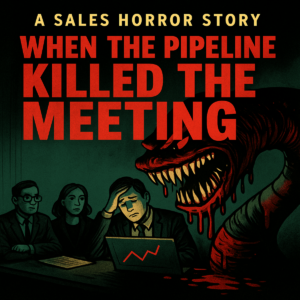Yesterday a successful business owner asked me an honest question: “Why should I care about blogging?” Traditional sales tactics are working well for him. The business is growing and sales reps are crushing quotas with tried-and-true prospecting techniques. “Is it worth my time and investment?”
As a Lanier-trained sales veteran that got old-school training in the analog copier days, I applaud his success. As my good friend Larry Levine of the Social Sales Academy says, “If you suck in the field and on the phone, you’re going to suck at LinkedIn.”
Blogging and social media is not about forsaking the old ways. Quite the opposite. Blogging and social media enhance the traditional sales techniques. In this article we’ll explore why a successful, old-school, door-knocking, phone-pounding sales team should care about digital marketing.
Two Types of Prospects
There are only two kinds of prospects: those who are searching for a solution to a problem and those who are not searching.
Not Searching: Sales
People who are happy with where they are form the vast majority of people. Your sales team is responsible for the second type. Their job is to develop relationships and “get in the way” of prospects, challenging them with better ways to do business. Some reps limit their tool kit to field cold calls and phone prospecting. Other reps embrace tools like LinkedIn and Twitter to enhance their prospecting. Either way, these sales people are responsible for developing relationships with people who are NOT SEARCHING for answers.
Searching: Marketing
There is a second type of prospect: the searcher. These are people that have a business problem and need a solution. It could be simple: “My contract is expiring and I need to see what my options are.” It could be more complex. Maybe their best friend’s server just crashed (this happened to me this weekend) and now they are looking for best practices in backing up their data.
This person is searching for an answer. Where do people go to get answers? They go to Google.
Did you know that right now there are people in your market looking online for answers to questions related to office technology?
When it comes to connecting with people who are searching for answers online, there are three questions you need to ask yourself as a business owner:
- How much additional revenue could I get if I had a strategy to attract prospects who are searching?
- How do I get found online?
- When people find my business online, what do I want them to discover?
Let’s tackle each of these questions:
1. How much additional revenue could I get?
This question can be answered by using a model similar to how you manage your sales reps’ prospecting. In sales, you want to know:
- How many calls did they make?
- How many appointments did they get?
Online, the metrics are similar:
- Calls = Website Visits
- Appointments – Conversions
How many people come to your website? You need to track this number. In particular, you need to look at how many people come to your website through search engines and social media. These are the people that have opened up Google, typed in a question and found your business’ website.
How many people request more information? This could range from filling out a “Contact Us” or “Request a Quote” form. It could also include a less-threatening call-to-action such as downloading a special report, white paper, or checklist. Every page of your website should have at least one call-to-action that makes it easy for SEARCHERS to raise their hands and request more information.
In sales, we know our ratios: ___ calls = one appointment. These days, it’s typically 50-100 phone calls for an appointment. In online marketing, we also know that we can expect between 0.5% and 1.5% conversion on website visitors that come through search engines. For every 1,000 people you get to your website through search engines you can expect 5-15 conversions. The question you need to answer is, “How many of these leads do I need to close a sale?”
Why is this ratio low? Similar to the sales ratio, there are lots of reasons. Not everyone that lands on your website is a human being. Many people come to your website and don’t find what they want and leave.
2. How Do I Get Found online?
Blogging forms the foundation of attracting and converting searchers for three reasons. First, the way you get found in Google these days is by providing fresh, relevant content for Google to index.
Let’s say someone in your market is searching for “best product” in your market. Google takes a look at the options. Business 1 has a website that is six years old with one page that talks about product. Business 2 has a website that is two years old that has three pages that talk about product. Business 3 has a blog on their website. There is an article about product from last week, two weeks before that, and another that’s one month old. In fact, the business with a blog has 35 pages on their website that talk about product. Plus, the website content is frequently shared across multiple social networks.
Google has built their reputation on providing fresh and relevant content from subject matter authorities. The third website with the most current information fits this requirement of being fresh. Multiple pages of content on the site related to the topic build authority with Google. The amount of social activity signals Google that the content is popular. Plus, links from social media drive traffic into your website, helping create even more visitors.
2. When Prospects Find My Business Online, What Do I Want Them to Discover?
Imagine sending out a sales rep that walked into an appointment and said, “We sell copiers, printers, fax machines, scanners, and document management. And we provide great service. What to buy one?” When the prospect asked questions about how the product could be used to improve their business, the sales rep said, “I don’t know. Do you want to buy one.”
Hopefully your sales team doesn’t do this. In a sales situation they are exploring ways that the products, services, and solutions can be applied to add value to their business or solve a business problem. This is the value-add of a sales rep.
While sales reps should be able to add value, most websites have very little information beyond what types of products they sell. Without a blog there is typically very little information on the application of those products. How can they help a prospect’s business? What benefits could be provided?
A blog transforms your website from a static brochure that says what you do into a helpful resource that shows prospects how they could benefit from your solutions. Your website begins to add value in the same way a sales rep adds value. It tells the prospect that when they engage with your company they are going to find a team of helpful professionals that can improve their business. This builds goodwill and brand equity with SEARCHERS who will be more likely to reach out to you when they are ready to take action.
To Summarize
- There are people searching online for what you sell. (Your sales reps probably don’t know who most of them are.)
- Blogging helps you get found online
- When people find you they find a helpful company and are more likely to reach out to you when they are ready to talk to someone
- Blogging helps you cross-sell new services and solutions to your client base
What Do You Need to Do?
1. Blog Regularly
To get traction with Google experts recommend that you add at least one article per week to your website. Companies that blog get 55% more web visitors.
2. Don’t Copy
Duplicate content on your website does not get indexed by Google–it’s already indexed somewhere else. Copying someone else’s content without their permission is also illegal. Plus if all you do is copy and paste content from other websites Google will penalize your business which could have long-term implications.
3. Share on Social Media
Amplify your blog content across social media channels like your company LinkedIn, Twitter, and Facebook pages. Then get your sales reps involved by sharing your blog content on their LinkedIn pages. All of this drives traffic to your website, helping grab the attention of searchers. As a side benefit you’ll generate top-of-mind awareness for your company and reps which helps them with their traditional prospecting.
Isn’t This a Risky Investment?
Maybe. But don’t you take risks every day when it comes to prospecting? You’re always rolling the dice on new sales reps. Most of them don’t work out. You invest time, training, and money and they leave.
Blogging is an investment. However, it’s an investment with staying power. Once the blog article is on your website it is there forever. Over time, you build a strong foundation of content that attracts people to your company.
What’s The Cost of Not Blogging?
Choosing not to take action is a strategy. By not blogging you will slip in search engines over time. You’re basically saying that, “We don’t care about people that are searching for answers. We are only going to build our business through building relationships with people that aren’t searching.” You’re also forfeiting the benefits of prospects and customers coming to your website and learning about all of the different ways your products, services, and solutions can benefit their business.




